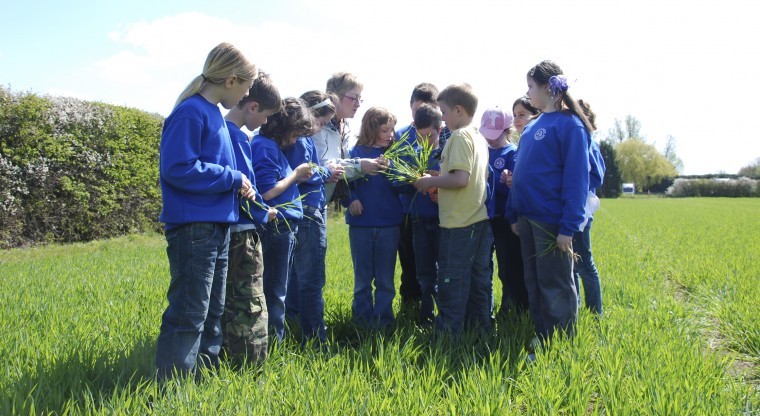Chris Philpot’s work to ensure that young people have inspiring experiences outside the classroom won him the award from the Council for Learning Outside the Classroom. He has been running educational visits at Barleylands farm park and craft village near Billericay for more than 30 years and has dedicated his career to teaching children about farming and the countryside.
Mr Philpot grew up on the farm with his father collecting vintage farm machinery, and in 1984 he decided, along with his family, to create a farm museum where the equipment could be displayed with information to help visitors understand more about food and farming. The museum was the catalyst for the development of the farm.
Until the late 1990s, Mr Philpot would host school trips by himself. Today, Barleylands employs an education team, with all school visits run by experienced staff trained by the Countryside Educational Visits Accreditation Scheme, who share his enthusiasm for creating fun filled educational experiences and days out for 14,000 children every year. Barleylands’ education officer is Karen Watson and she congratulated Mr Philpot along with Elaine Skates, chief executive of the Council for Learning Outside the Classroom; and Emily Fulda of Canal & River Explorers, which sponsored the award. Almost six thousand votes were received for this year’s awards.
Mr Philpot said: “I would like to thank the team at Barleylands for all the work that they do. They demonstrate such commitment and dedication to ensuring that young people of all ages have memorable hands on experiences which bring farming and education to life.”
At the farm museum – now called the Discovery Barn – children can grind wheat, match seeds to food, make healthy lunchboxes, learn about food miles and try milking methods from the past.
From growing crops, vegetable plots, a polytunnel, farm animals and a purpose built kitchen classroom where children can cook from scratch during a visit, Mr Philpot has developed the farm over the years, adding a host of new experiences.
Altogether, the Philpot family farms arable and specialist crops such as borage on 12,000 acres across Essex and Suffolk. Mr Philpot’s brother Stuart farms the land immediately around Barleylands, which Chris Philpot described as “mission control” for the whole enterprise.
At Barleyfields, Mr Philpot meets Stuart and his other brother Andrew and father Peter every morning at 6.40am for an update. The farm is divided between the four of them, each having roughly a quarter of the area to manage independently. The arable crops are mainly first, second and bread making wheats with oilseed rape, peas, beans and lucerne. Potatoes are also grown. Out of 2,000 acres of oilseed rape grown last year, only about 300 acres were harvested because the weather was so dry, Mr Philpot said. “The seed germinated but it never got going. I don’t think the cabbage stem flea beetles had a chance to attack the crop.”
Farming’s image has changed considerably since Mr Philpot was at school in the seventies and eighties. Then, he said, the industry was seen as a good thing. Now the industry’s image needs promoting as much as possible, and it is more important than ever to explain to children where their food comes from. “After all, not everything comes from supermarkets!” he said. If everything is explained carefully – such as the journey a beef animal makes from a field via an abattoir and shop to a plate – then children will accept information far more readily than teachers, Mr Philpot added.
Schools will no longer go to farms just for a day out. “They have to have a reason to go to a farm. Other farms may have as many children as we do over the year, but I doubt whether any will actually cook with 14,000 of them.” Hygiene on the farm is particularly important, and children sing a special hand washing song to make this an enjoyable task. Health and safety is “absolutely paramount,” and Barleylands runs continuous risk assessments.
But health and safety costs have hit the Essex Country Show which was run at the farm for 30 years and had to close last year (2016). “We did it for the community but it was a huge risk and required a lot of manpower for the 35,000 visitors we had over two days.” But an equestrian centre with 44 stables opened in 2016 alongside all the other attractions which include 50 football pitches. This year (2017), the Barleylands restaurant will be expanded.
Barleylands is one of the most diversified farms in the country, but it faces more change following the Brexit vote. “This farm – like others – can adapt to change given the chance,” said Mr Philpot. “But we need the government to support us and work with us during that time of change.”




